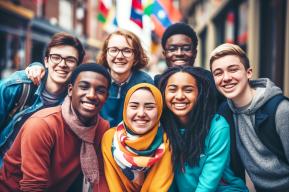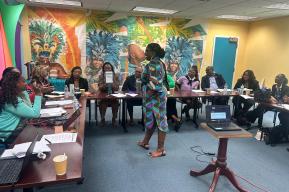News
UNESCO Engages Technology and Policy Experts for Human Centered AI in Africa

UNESCO organized two workshops on Artificial Intelligence and Fairness at the Deep Learning Indaba 2019, the annual gathering of the African Machine Learning Community at Kenyatta University in Kenya. These workshops were organized as a follow-up to the Outcome Statement of the UNESCO Forum on Artificial Intelligence in Africa at Benguérir, Kingdom of Morocco in December 2018.
‘Indaba’ is a Zulu word for a gathering or meeting. In true spirit of the word, the Deep Learning Indaba 2019 was a gathering of about 700 members of the African artificial intelligence community and its supporters for a weeklong of teaching, research, exchange, and debate around machine learning and artificial intelligence, including its implications for humanity and Sustainable Development Goals.
UNESCO advocated for human Rights centered, Open, Accessible and Multistakeholder driven development of artificial intelligence as outlined in its study “Steering AI for Knowledge Society: A ROAM Perspective”. The workshop brought together experts in the domains of law, gender, AI, ICTs and community development from within Africa to present their insights and exchange ideas with AI researchers and students at the Indaba.
Teki Akuetteh Falconer, Lawyer and Executive Director of Africa Digital Rights’ Hub, speaking on Fairness, Transparency & Data Protection as Building Blocks to human-centric Artificial Intelligence Systems; underlined that waiting for law to catch up with technology has proved to be ineffective due to the rapid pace of change in technology. She therefore stressed the need to incorporate human rights concerns from the design stage for AI, as the relationship between AI and people is a symbiotic one. She further stressed “privacy is the essence of who I am” and therefore if AI systems are built to enhance human life, it is only imperative that privacy protection is built-in different products and services to ensure trust, fairness, transparency and safety of all.
A recent UNESCO publication, “I’d Blush if I could”, reported that several AI applications like digital voice assistants perpetuate harmful gender biases. Data forms the basis of AI development and ICT researcher Grace Mutung'u showed how data collection processes, including in national censuses and Digital ID projects are not gender sensitive. In one such example, she explained how questions about childbirth and stillborn babies in census surveys force women to live their trauma repeatedly.
In another example, she flagged that gender based discrimination can be embedded in several digital ID projects that rely on historical data that treated women as appendages to men. She appealed for data collection processes to be gender sensitive and to be tested for historical biases against women. Her remedy, “Incorporate more women and gender specialists in data collection and survey design processes”.
The Deep Learning Indaba provided a platform for sharing the best AI research emerging out of Africa; however, the question of access to data, computing power and knowledge remained top on the minds of students and university professors alike. Raymond Onuoha, ICT policy researcher at Lagos Business School and UNESCO’s inclusive policy lab, pointed out that Internet penetration in Africa is still very low at an average 21% for the continent to benefit fully from the AI economy. He argued that high cost of internet services; low investments in infrastructure along with digital illiteracy are issues that need to be addressed for Africa to fully harness its AI potential.
Speaking about openness and transparency in AI, Research Scientist Nazneen Rajani discussed the ‘Black-Box’ problem of AI and presented how AI models may produce correct results without explaining how these results are produced. The ‘Black-Box’ problem of AI threatens accountability in decisions taken by machines. She shared research on how sustained efforts by researchers to make AI explainable have the potential to improve accountability including based on her approach of ‘Common Sense Reasoning’ to explain the decisions taken by AI algorithms.
The speaker session followed a deep dive engagement with case studies on topics concerning AI, privacy, access and online education, where a diverse group of AI researchers, data scientists, students and policy researchers worked together. At the conclusion of the workshop, the participants expressed a desire to strengthen engagement between the policy and technology community in order to build a strong human centered African movement in AI.
Bhanu Neupane of UNESCO underlined the organization’s commitments to capacity building and raising awareness in order to strengthen the digital technology and policy ecosystem in Africa, including through its participation at the Deep Learning Indaba 2020 in Tunisia. He added that the outcomes of the workshop would help achieve the objectives concerning i) Human Capital and social capabilities; and ii) Policy, law and human rights of the UN system-wide strategic approach and roadmap for supporting capacity development on artificial intelligence.
UNESCO would like to thank the AI4D Initiative in Africa, IDRC and Knowledge for All Foundation for supporting the workshop through travel grants for the participants.
Information about UNESCO’s work on human centered AI is available at https://en.unesco.org/artificial-intelligence. For more information, please contact Bhanu Neupane (b.neupane@unesco.org) or Prateek Sibal (p.sibal@unesco.org)





